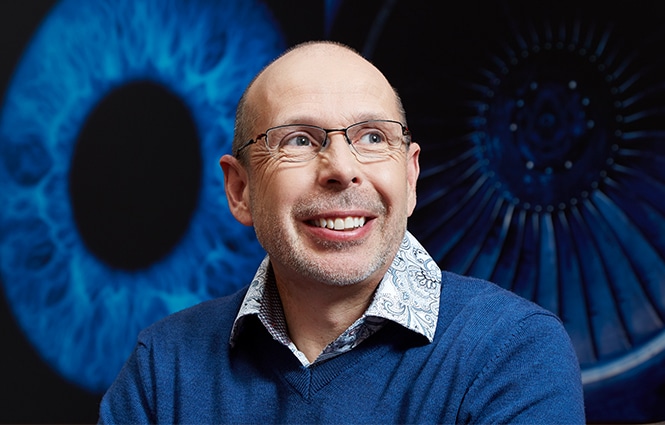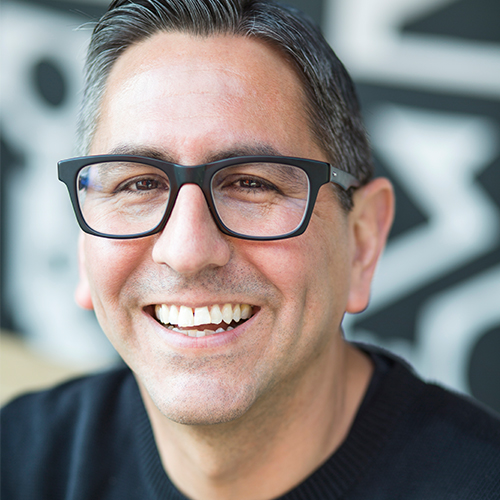|
Getting your Trinity Audio player ready...
|

Dystonia: it’s a word that Joe Beery, chief information officer of Thermo Fisher Scientific, never thought would be a part of his life. But it has now become integral to his personal and professional journey.
In 1996, Joe and his wife, Retta, brought home their newborn twins, Noah and Alexis, but the infants were plagued with severe health problems that Joe, Retta, and their physicians did not understand. The symptoms included body tremors, seizures, and eventually difficulty walking. Noah had drooling and motor skills issues, and Alexis had trouble breathing. To make the case even more curious, their symptoms would fluctuate throughout the day.
The twins were then misdiagnosed with cerebral palsy. After years of research, Retta found an article that led them to a new diagnosis of a rare and poorly understood genetic disorder called dopa-responsive dystonia (DRD)—a movement disorder caused by a deficiency in dopamine. So they started Noah and Alexis on a synthetic dopamine called levodopa, and they began to get healthier.
After years of healthy living, though, Noah and Alexis began to show symptoms again. So, Retta asked Joe, who had just started working for Invitrogen (which became Life Technologies and was later acquired by Thermo Fisher), to see if it was possible to sequence their children’s genomes to find the root problem.
In 2010, Noah and Alexis’s samples were sent to the Baylor College of Medicine for sequencing analysis. The researchers found that the twins had genetic mutations that affected the synthesis of both dopamine and serotonin. So, not only were the twins producing low levels of dopamine, but they were extremely deficient in serotonin. When the doctors added 5-hydroxytryptophan (5-HTP), a serotonin precursor, to their treatment, the twins’ health returned to normal, and they were able to begin living full, healthy lives again. If it wasn’t for Joe’s connection to the industry and the sequencing technology the company creates, Noah and Alexis’s lives could have turned out quite differently.
“Our next-gen sequencers—from a father’s perspective and from a family perspective—in essence saved my twins lives,” Joe says. “From a Thermo Fisher perspective, I tell people that I would basically do whatever the company asked me to do simply because I owe the lives of both my children to the products that we manufacture.”
Needless to say, Joe Beery is personally invested in Thermo Fisher’s mission of helping customers make the world healthier, cleaner, and safer. To that end, he also has a strong interest in seeing the global company succeed long beyond his tenure. For him, diversity and inclusion are imperative to that success. He discussed this topic with Hispanic Executive, along with digital transformation, and more.
What does diversity and inclusion mean at Thermo Fisher?
There’s a lot of focus on diversity and inclusion here at Thermo Fisher, and I have seen an emphasis on this from the top down. It’s important, as a large global company, that we recognize that diversity—including geographical and cultural diversity—makes a big difference.
I’ve actually been an executive sponsor of several of our employee resource groups (ERGs). We have a women’s ERG and the African American Heritage resource group, and I sponsored the Latin American heritage group. I now am the sponsor of the millennial employee resource group. A lot of our diversity is actually from the ground up. In sponsoring these groups, we’ve been able to focus on diversity and inclusion at all levels of the company.
What compels you to volunteer and get involved with the employee resource groups that you have?
There are two things. One is that I’m Hispanic, and I think we’re underserved. I felt like it was my job, in the position that I’m at the company, to promote my heritage and my people.
I also think that companies that are going to be successful for the next fifty years are the ones that are focusing on actually integrating a lot of this into how they do their jobs—because the world is changing and jobs are changing every single day. The digital world is just completely going to change the way many jobs are done today. I want Thermo Fisher to be successful well beyond my life, and I think that’s one of the reasons we have to do this.
You’ve mentioned that your Hispanic heritage comes from Spain, and that because you are a white-passing Hispanic, you have a unique perspective on what diversity and inclusion means. Can you elaborate on that?
It’s been an interesting journey because what I’ve learned the most and what I’ve seen is that it’s not always what you see or what you think when you meet someone. I look white, but my green eyes actually came from the Hispanic side of the family. Everybody assumes that they came from my Anglo side.
You can’t have an unconscious bias about who somebody is based on what they look like. The opposite of that is when people sometimes treat me one way because of how I look and then they treat me another way when they know where I came from. I’ve never changed; I’ve been the same person since I was born.
I have learned that people have biases that can change. When I first started at another company, I didn’t tell them that I was half Hispanic, and they had a large program to hire minorities. When they found out, they asked me to change the form to check the Hispanic box, and then I was treated differently.
I think that’s when I think about the fact that I can see the bias both ways and then I can see if there is a bias when somebody finds out that I’m actually Hispanic. I think that’s what has been fascinating about it.
Then, there are other people I found that share similar but almost opposite experiences. There are people with the names Garcia or Mendoza or Lopez, and people will have an idea of who they are. Then, they meet them in person and find out that that’s their married name. It’s the same formula.
Do you see that changing in the future?
Yeah I think so. I think it’s fascinating. I have three millennials at home, and I’m very close to all of my kids. I think the millennials have this figured out. I have so much hope in the next generation.
Seriously, there’s just a different level of acceptance that I think they’ve grown up with. Maybe it’s good parenting or maybe it’s that they’ve figured it out on their own, but I’ve never seen or heard any of my kids or any of their friends treat people differently because of a last name, color of their skin, or anything like that.
I also think that companies like Thermo Fisher are really embracing the fact that there is a competitive advantage from diversity. If it isn’t the fact that kids are growing up without some of these biases, companies are starting to see that your heritage or your diversity and being inclusive are competitive advantages.
Tijuana Talent
In 2016, Thermo Fisher Scientific opened its Software Center of Excellence in Tijuana, Mexico. But the company might have opened the center somewhere else if it weren’t for the foresight of chief information officer Joe Beery.
The company already had software developers in India, and leadership was looking for a similar cost structure. But they wanted a workforce that was in the same time zone as its San Diego, California, facility, which is home to about five hundred IT professionals.
Beery had previously worked with software centers in Guadalajara, and he felt that Mexico was a good place to attract talent—and it was in the right time zone. He was also on the advisory board for the San Diego Economic Development Center, and he knew the organization was developing was a cross-border initiative with nearby Tijuana, so he and the company began to look at that as an option.
“I found that all of the high-tech companies in the Bay Area fly over Tijuana,” Beery says. “They don’t stop because it’s hard to get to because you have to fly into San Diego, and San Diego doesn’t have a big airport. They all go to Monterrey, Mexico City, or Guadalajara. We kind of took a chance on Tijuana, and I can tell you that it’s been a home run.”
Now, Beery makes frequent trips there to connect with the workforce, which he says is a highly motivated, younger group.
“It’s just been a really great addition to the Thermo Fisher team, both in terms of cultural diversity as well as just raw technical horsepower,” he says. “I love going there.”

